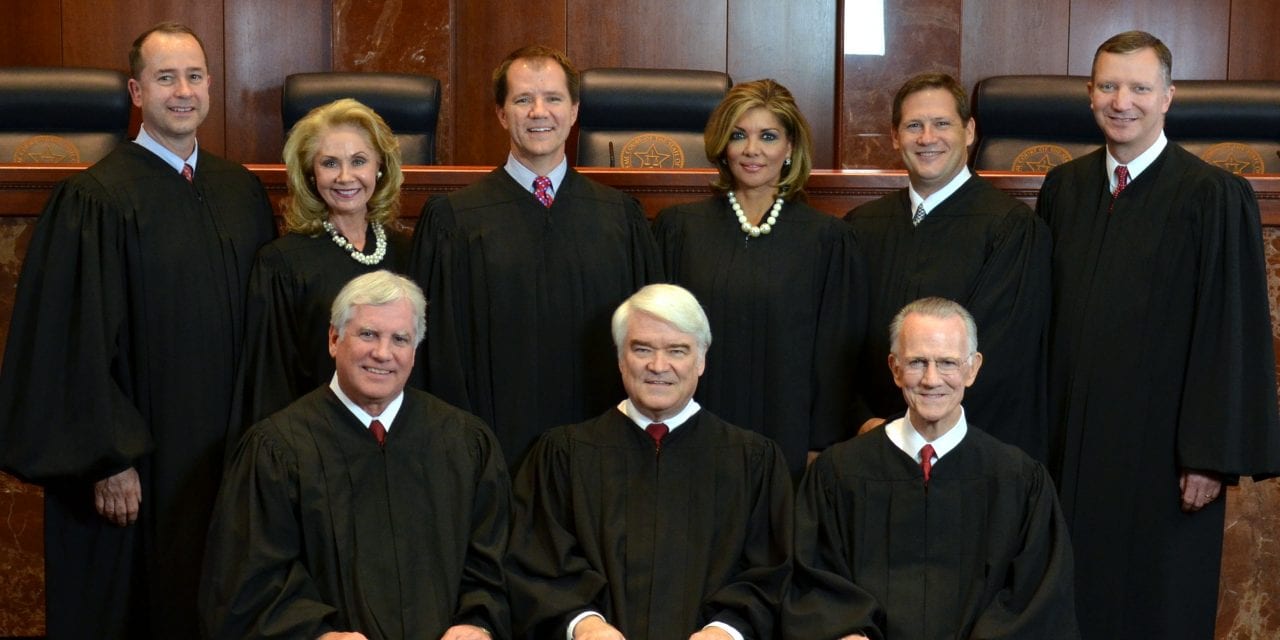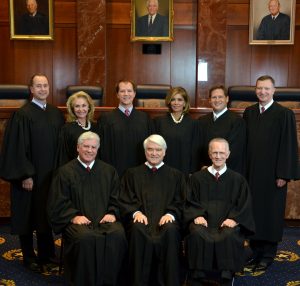AUSTIN — The Texas Deputy Attorney General for Legal Counsel argued before the Texas Supreme Court on Tuesday that state law requires marriages to be recognized before a divorce can be granted.
The Supreme Court took up the issue of gay marriage, considering whether the law allows same-sex divorce despite it not recognizing same-sex marriage.
The two cases involving two couples married in Massachusetts, Dallas couple H.B. and J.B. and Austin couple Angelique Naylor and Sabrina Daly, were consolidated for arguments.
The Dallas couple are still trying to get a divorce in the state. The case’s main issue deals with whether a trial court has jurisdiction over a same-sex divorce. The lesbian couple was granted a divorce in family court, but Texas Attorney General Greg Abbott appealed the decision.
Arguments for the couples focused on the validity of the marriage in another state, while highlighting that only the parties petitioning for a divorce, and not the state, have a right to contest it.
The state argued that the constitutionality of the state’s ban on same-sex marriage was brought into the cases and judges who ruled in the cases previously. Therefore, the state was justified to intervene and defend state law, which doesn’t recognize the marriages for any purpose.
Jody Scheske, the attorney for the gay couples, argued that despite Texas not recognizing same-sex marriage, gay couples are marrying in other states where same-sex marriages are legal. If those couples later divorce, they must petition their state of residence for a divorce.
“Although Texas bans same-sex marriage, it bans the recognition of those marriages, it bans the creation of those marriages, Texas cannot prevent its gay and lesbian citizens from getting married,” he said.
Justice Don Willett asked if a state has to first recognize a marriage before granting a divorce. Scheske replied that marriage and divorce are separate. Other justices questioned the validity of that argument by asking if the state must recognize a marriage as valid before granting a divorce.
The question of whether state law prohibiting gay couples from marrying was out of animus was discussed. Texas voters overwhelmingly passed a marriage amendment in 2005 prohibiting same-sex couples from marrying. The state family code prohibits any recognitions of anything identical or similar to marriage, according to the amendment.
But Scheske said those laws relate to marriage, not divorce, and didn’t apply.
Justice Phil Johnson disagreed.
“You must have a marriage before you can have a divorce,” he said.
Scheske said the “treatment of Texas to those marriages doesn’t change their validity.”
In the matter of jurisdiction, Scheske said the state family code doesn’t specify jurisdiction.
As for annulling the marriage instead of granting a divorce, Scheske said the union was legal in Massachusetts and took place, so the couple need a divorce.
Chief Justice Nathan Hecht asked if there was any divorce a state wouldn’t grant other than one involving a same-sex couple.
For instance, if a couple married at 16 in another state and later moved to Texas, the state does recognize those marriages and would grant a divorce. Texas law allows people 18 years old and older to legally wed, so the validity of the underage couple’s marriage could be challenged. However, Scheske said he had no doubt that marriage would be dissolved unless one of the parties contested the divorce. The difference in the current case, he said, was that the Dallas couple were being denied the opportunity to have their case heard.
Hecht asked how the court could grant relief if the union was valid under Massachusetts law. If the divorce also was granted in that state, every state would have to recognize it, challenging the full faith and credit because each state would apply its own law and make a judgment.
James Blacklock, with the attorney general’s office, argued that both parties have challenged the constitutionality of Texas’ law in their cases. Therefore, the attorney general has standing to defend the law.
“There is no way to grant a divorce without recognizing a marriage,” Blacklock said, adding that state law defines marriage as between a man and a woman. “So there are not marriages here and, therefore, there can be no divorce.”
Justice Eva Guzman brought up property and other rights, questioning how a union could end and assets divided without a legal process. She said there would be certain rights awarded to the couples in Massachusetts if they were divorced there but not in Texas, so dividing assets in their home state became a challenge.
But Blacklock said the assets would be divided in a way to appease the parties. When asked about children, he said the Austin couple has a child, but the case doesn’t deal with a child-parent relationship.
Justice Paul Green raised the issue of taxes and that legally wed same-sex couples in the state can file joint taxes because the federal government recognizes the marriage in light of the U.S. Supreme Court’s ruling in the Defense of Marriage Act.
Blacklock said the marriages were void in the state for every purpose.
Willett said it seemed to place the outcomes in disarray if the marriages were ruled invalid and not divorced, in light of property and children. Currently they’re not divorced, but a ruling could find them never married.
Willett also said reading the U.S. Supreme Court’s ruling was “disharmonious” because equal protections and variation on treatment are constitutional guarantees even though the ruling was only regarding federal recognition of same-sex marriage.
Jonathan Saenz, president of conservative group Texas Values, said the case seemed clear after the state made its case for the state marriage amendment.
“This is an easy case for the Texas Supreme Court to decide,” Saenz said. “And it really lies in what’s in the statute, what’s in the Texas Constitution, so there’s really no way to get around it.
“As far as their role, it’s real simple, he added. “They’re going to look at the constitution, look at the statute and uphold the will of the people.”
Scheske said afterward he was pleased the court heard the cases, which have been before it since 2011, and thought the justices were well prepared.
“The issue is whether all Texas residents have an equal right to get a divorce,” he said. “All Texans should be treated equally in that regard.”
If the court rules the state does have standing to intervene, Scheske said justices would be writing a new law because only the parties to a divorce have the right to attack it’s validity. States are not bound by judgment and can’t sue for divorce.
The court doesn’t have a deadline to issue a decision, but Scheske said he expects a decision by the spring or as late as the summer when the court recesses.
“We intend to prevail,” he said. “I believe that’s what will happen.”

















